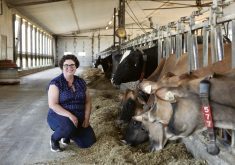Picture this. The bride, decked out in finery, arrives at the church on the morning of her wedding. As she reaches the church doors, a man in a suit blocks her way. In his hand is a prenuptial agreement ensuring she has no rights to the property of the farmer she’s marrying. If she wants to get married today, he says, she has to sign it.
This is a true story.
And its unhappy ending isn’t hard to guess. The marriage didn’t last, and the contract — signed under emotional duress — didn’t stand up in court.
Read Also

Sibling squeeze part 6: The emotional stakes of a family legacy
The final instalment in a six-part series exploring the challenges of sibling conflict and the effect it can have on…
But beyond its ugliness, there are other problems with the story, says Valerie Panko, a transition specialist for Farm Credit Canada. And the first and biggest is that it represents an old-fashioned “soap opera” understanding of a prenuptial agreement.
Thanks to Hollywood, some variation on this tale — in which the farmer’s would-be spouse is legally cut off from farm assets — plays in most people’s heads when the topic is broached. In another version, farm parents insist on a marriage contract to prevent their son’s profiteering bride from leaving him, taking half the farm’s equity with her.
There’s also a degree of gender imbalance in these stories, in which women are cast as “newcomers” to the farm or liabilities threatening farm stability, rather than farm owners or equal partners.
Negative associations like these are the main reason why very few Canadians — under eight per cent — sign prenuptial agreements, and why the topic can be so divisive.
Panko believes it’s high time the soap opera version was laid to rest and that more farmers embraced prenups as legitimate financial risk management tools.
“Farmers operate million-dollar businesses and they need to up their financial game,” Panko says. “It’s a sign of moving things into this century where business management skills are at the forefront.”
Provincial differences
The most recent statistics say 43.1 per cent of marriages in Canada terminate by their 50th year.
Over the years, according to John-Paul Boyd, an Alberta-based family law arbitrator, Canadian law has relaxed its rules on grounds for divorce and tightened the rules for equitable property division.
But farm readers also need to be forewarned that across Canada, the rules about property division vary depending on the province or territory.
“Each province and territory has its own test to decide who qualifies as a ‘spouse,’ a ‘partner’ and so forth, since you don’t want to catch roommates in the definition,” says Boyd. “In B.C., for example, you have to live together for two years in a ‘marriage-like relationship,’ while in Alberta you have to live together for three years in a ‘relationship of interdependence.”
Only a few provinces allow unmarried couples to share property, he adds.
Boyd says most clients requesting prenups are parents who don’t want to see family patrimonies dissolved as a result of a bad marriage. “It’s the scions of the wealthy, and their parents don’t want to see family money diluted,” he says.
“The fear that a lot of farmers naturally have is that when they divide their farm among their children, if a child makes a bad marriage and separates, part of the farm will be lost, if not physically, with an actual transfer of title, then through compensation payments. It’s potentially a huge amount of money.”
When farm property is on the line, it’s absolutely key to know the law as it applies in a given province, but the law as it is “is usually pretty fair,” Boyd argues. The grim scenario of one partner walking away with half the value of the farm is pretty unlikely, he says.
In most provinces, assets are divided fairly following divorce, with each spouse taking the value of the assets they brought into the marriage, but sharing in the increase in value of those assets as well as the assets bought during the marriage, Boyd explains. In other provinces, however, spouses are presumed to share equally in everything used for a family purpose.
In other words, by law, partners would leave with half the increase in the value of the farm over the term of the marriage — but particularly in Alberta, there’s sensitivity to not dividing farmland itself, and few people walking away from a marriage would be allowed to co-opt half the property equity.
Given provincial differences, Panko cautions that anyone entering a marriage should know how property rights work in their home province, and what they and their partner potentially stand to lose financially should the marriage end.
Leaving these tricky questions to the courts means farmers have to live with a degree of uncertainty. The alternative is to plan for the risk. Prenups help families articulate their expectations well in advance of a marriage, “when they’re stone-cold sober,” says Panko — ensuring that if the marriage ends, “everyone is looked after.”
Fairness is key
Vanessa Stockbrugger, the founder of Alberta-based financial education and coaching consultancy Womencents, says that money is an emotional topic for farmers because it’s connected to land that, in some cases, has been in the family for generations. For that reason, it’s important to seek outside advice.
“Go and spend time with a lawyer or independent advisor and understand what your rights are. Knowledge really is power,” Stockbrugger says. “Talk to people you trust who are away from the situation.”
Stockbrugger’s goal is to empower women to make more informed decisions about wealth management. Farm women should own these discussions because, in many cases, they own the wealth: women are projected to control almost half of all accumulated financial wealth in Canada by 2026, according to an IPC Securities Corporation white paper, and are often equal partners or farm owners in their own right.
Stockbrugger says in her experience women are less likely than men to ask for a prenup even though the patriarchal farm is in many ways a thing of the past. That’s why she believes women should be “strong” on the topic of wealth management and intentional about planning for risk.
“Structure the prenup to preserve the intention behind it,” she says. “How do you carve off a piece of value of the homestead? Be creative, and whatever your intention, make sure it’s accomplished. But it has to be fair. Regardless of her role on the farm, she’s going to work extremely hard.”
Because of the intergenerational reality of most farms, the document also has to be fair to farm parents who, more often than not, still have a stake in the farm.
Panko says it’s because the topic of prenups is so emotional that farm parents are often afraid to bring it up for fear of causing conflicts with their children. This in turn interferes with succession planning.
Panko will joke at transition planning meetings that she can bring up prenups because she’s not coming to the family’s Christmas dinner no matter what. “I say, you can discard it, but it’s important to understand that these tools exist and have a better understanding than this soap opera version.
“If the mother-in-law brings it up, it automatically looks personal, even though it’s a financially sound risk management tool.”
In at least 80 per cent of the families she counsels, the older generation watches the discussion unfold without saying a word, Panko says, even though they potentially have a large stake in the discussion. That’s why she hopes the culture is beginning to change, and that the younger generation will take the bull by the horns and bring up the P-word in transition meetings.
“If the younger generation brings it up, the parents can get involved and start talking about it and drafting their own version. It’s not a template agreement — it’s a negotiation; that’s the whole point. You create a contract and an agreement that suits everyone involved,” she says.
When prenups are used correctly, they ensure both partners are appropriately provided for in the unlikely event of a divorce. If the prenup is going to stand up in court, fairness is non-negotiable.
Boyd says the extent to which the courts are prepared to honour the agreement relates to the correlation between the couple’s expectations at signing the agreement, and their expectations at the time it comes into effect.
Set up for success
Open communication is absolutely key to any financial discussion, says Stockbrugger, especially preceding a marriage. “You’re marrying this person, so the financial information should be shared as well. If you’re going down the road of a prenup, communicate that early, and explain the reason why.
“Be very clear on what you’re trying to protect yourself from and your intentions.”
Panko says she’s seen many cases where a frank discussion about a prenup would have saved families a lot of stress down the line.
In one case, a farm family set up a trust for their son prior to his marriage. It backfired. A decade later, the son owned almost no farm assets, even though he’d built the business exponentially, and the farm parents’ relationship with their son and his wife and children had soured seemingly beyond repair.
The family finally sought a spousal agreement and reconfigured farm ownership in the interests of keeping the family together. The resulting hours and hours of legal advice and shareholder transfers were costly, and the father called to complain about the mounting expenses.
“I had to remind him that of course that this was his doing. They needed to take all these expensive steps to rectify the situation that he’d inadvertently created,” Panko says. “To me, upfront discussion and communication and setting expectations gives you a chance to deal with them at the outset. Dealing with them after many years of baggage buildup… you can’t tell me that’s a better option.”
Get an early start
Family law arbitrator John-Paul Boyd says that if a farm family decides to pursue a prenup, they should do it well before the date gets set and the invitations get mailed out.
In fact, you may want to do it years before, while the kids are in their teens.
Farmers should also take the time to get advice on whether a prenup really is necessary for their situation, Boyd says.
As a basic starting point, he says, you should talk to a lawyer. Learn how the law works in your home province and ask whether its provisions seem fundamentally fair before you seek a prenup.
“It is worthwhile spending a few hundred dollars getting legal advice about what will happen in the event that your marriage breaks down. Think of that against the cost of not just drafting up and signing a prenup but also the cost of future litigation if the prenup isn’t fair,” he says.
“The difficulty is using the crystal ball to predict where you’re going to be, when the crystal ball is usually inaccurate,” Boyd adds. “You have to worry that the court will not respect the agreement anyway.”
No prenup will ever be perfect, Boyd argues, because it’s impossible to predict the twists and turns life will take.
By the same token, prenups aren’t inherently right or wrong. Only the farm family can decide whether they’re right for their operation. And only the farm family can decide to approach the topic with common sense and good will.
Valerie Panko, a transition specialist for Farm Credit Canada, believes prenups aren’t inherently antagonistic. There’s another way to approach them, she says. It emphasizes their link to strong family values.
A family she knows developed a strategy that couldn’t be more different than the church-door ambush.
“The family started this planning when all of their children were teenagers, before they had partners. It was a foregone conclusion they would be expected to have prenups, and every one of them was on-side with it because they agreed with the principles,” she says. “They looked at it from the perspective of the farm — they had siblings they didn’t want to get the short end of the stick.
“It’s not adversarial,” Panko says. “It’s about protecting the farm. And the family,” she says.
















